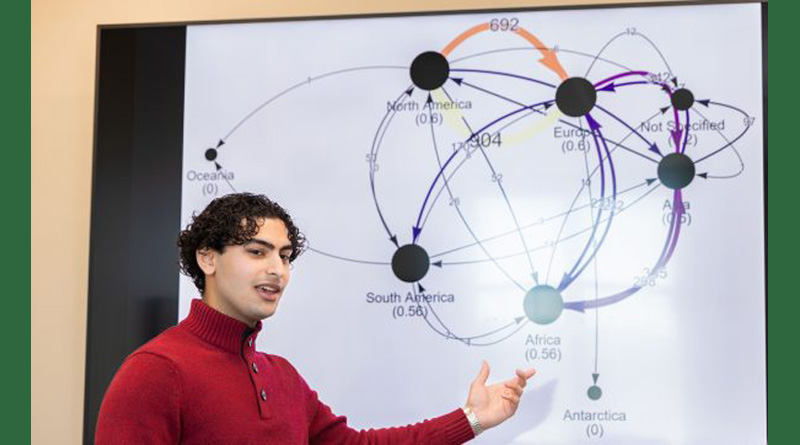Charlotte Researcher Khaled Obeid’s Contribution Is Helping The World
Avian influenza, or bird flu, is a virus that is on the mind of many in the United States and globally. The disease, which historically is transmitted by wild and farm birds, recently has jumped to other farm animals and humans. The mass infections of chickens has forced farmers to reduce their flocks resulting in the rise in egg prices.
Khaled Obeid, a senior undergraduate student and researcher at the Center for Computational Intelligence to Predict Health and Environmental Risks, is working in conjunction with Dan Janies, the co-director at CIPHER and a pioneer in bioinformatics, to identify the roots of this issue. The team uses advanced algorithms to compare the DNA sequences of H5N1 (avian influenza) viruses against other viruses to identify shared mutations. From there, they are able to build a branching structure (tree) to plot the disease’s past and present.
“It feels good, first of all, to know something I’m contributing to might help the world,” Obeid said.
Obeid, who is in the bioinformatics early-entry master’s program, works with Richard Allen White, assistant professor of bioinformatics. White recommended Obeid join Janies and Colby Ford ’15, ’18, a CIPHER visiting scholar, to help on a H5N1 paper — which tested the effectiveness of the bird flu vaccine over time. For an upcoming paper, Obeid is examining data on how the virus is adapting from birds to cows, and ultimately humans. His main functions are to break down large datasets into digestible spreadsheets, pull protein data for antibodies analysis and label each virus by its characteristics.
“The more I examined this data, the more I appreciated it,” Obeid said. “I get to see how big the datasets are. I got to see where influenza really comes from, and therefore, it became more and more interesting to me.”
The role of “data wranglers” like Obeid is critical for research on H5N1. The parent dataset for the virus can exceed 13,000 entries. Sometimes, it takes months to collate a dataset into useful and organized subsets of data.
“The ability to create data far outpaces our ability to analyze it,” Janies said. “Computers get faster, but also we have to make more people like Khaled who can analyze the data.”
Janies said data gathering for research like this requires a unique set of skills. Obeid needs to blend knowledge of computer science and biology in order to build a dataset tailored to test the hypotheses. For Obeid, the opportunity to work alongside Charlotte researchers has been great for his career development.
“It’s a privilege,” Obeid said. “I get to work with great minds like Dr. Janies, which will help me out in any sort of career in the future. Whether or not I continue to do research, I’ll have the experience under my belt to go ahead and start something with a data analyst position.”
On Thursday, Feb. 13, UNC Charlotte announced its classification as a R1 research institution. Obied said the designation is a point of pride for the research community at Charlotte.
“Our R1 status shows to everyone else how great UNC Charlotte is. It may also help with recruiting more influential people to the University.”

